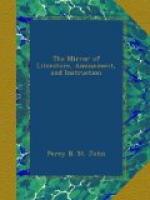Shakspeare, who was a minute observer of the anatomical and physiological varieties of the human frame, did not allow this dissimilarity to pass unnoticed; and, moreover, he starts a query that has never been satisfactorily answered, from his time to the present; viz. “Canst thou tell why one’s nose stands i’ the middle of one’s face?"[4] And his nice discrimination about noses extends also to shape and colour.—from the “Red-nosed innkeeper of Dav’ntry,"[5] and the “Malmsy-nosed knave, Bardolph,"[6] to him in Henry V., “whose nose was sharp as a pen!”
[4] Lear.
[5] 1 Henry IV. iv. 2.
[6] 2 Henry IV. ii. 1.
This celebrated “Malmsy-nose” possessed properties unknown to the same feature now-a-days. It was adapted to practical utility, in its application to domestic purposes, and moral instruction, by that great admirer and competent judge of its virtues, Sir John Falstaff, to whose sheets it did the office of a warming-pan;[7] and who made as good use of it as some men do of a death’s head, or a memento mori: “I never see it,” said he, “but I think upon hell fire.” It stands almost unrivalled in history, and ranks at least with that which gave a cognomen to Ovid,[8] and the one to which the celebrated violoncello player, Cervetto, owed the sobriquet of Nosey. This epithet reminds me of another nose of theatrical notoriety, whose rubicund tint, when it interfered with the costume of a sober character which its owner was enacting, was moderated by his wife, who, with laudable anxiety to keep down its “rosy hue,” was constantly behind the scenes with a powder puff, which she was accustomed to apply, ejaculating, “’Od rot it, George! how you do rub your poor nose! Come here, and let me powder it. Do you think Alexander the Great had such a nose?”
[7] Henry V. ii. 1.
[8] “Ovidius Naso was
the man: and why, indeed, Naso; but for
smelling
out the odoriferous flowers of fancy?” says Holofernes,
the
school-master, in Love’s Labour Lost.
Nor would I omit to mention one, contemporary almost with the above, by which the public peace was said to be endangered, as recorded by a poet of the day, who states,—
“Amongst the crowds, not one in
ten
Ere saw a thing so rare;
Its size surpriseth all the men,
Its charms attract the fair.
’Tis wonderful to see the folk,
Who at the nose do gaze;
All grin and laugh, and sneer and joke,
And gape in such amaze.
The children, whom the sight doth please,
Their little fingers point;
Wishing to give it one good squeeze,
And pull it out of joint.”
Much more is said by the poet in its praise; at last he falls into a moral strain:
“For many, as you may suppose,
’Gainst nature loudly
bawl,—
That one man should have such a nose,
Whilst some have none at all.”




